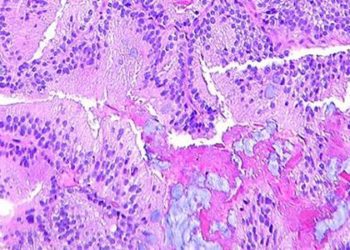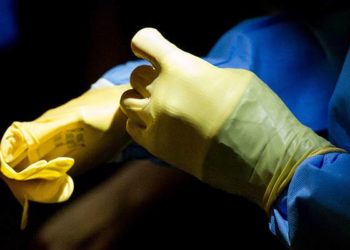Minimally invasive surgery is beneficial for epithelial ovarian cancer
1. Conducting phase 3 of the Laparoscopic Cytoreduction After Neoadjuvant Chemotherapy (LANCE) trial is feasible, as evidenced by an adequate accrual rate along with a low rate of treatment crossover between minimally invasive surgery (MIS) and laparotomy.
2. Compared to laparotomy, MIS provided some benefits to patients including a shorter median hospital stay length, and better levels of social functioning.
Evidence Rating Level: 1 (Excellent)
Study Rundown: Cytoreductive surgery is a method used as primary treatment for epithelial ovarian cancer (EOC), fallopian tube carcinoma, and primary peritoneal cancer. However, this type of surgery carries risks of complications possibly making it harder to administer chemotherapy promptly. Recently, some randomized clinical trials (RCTs) have demonstrated that administering neoadjuvant chemotherapy (NACT) before cytoreductive surgery reduces surgical morbidity and increases patients’ quality of life in those with end-stage EOC. The goal of this RCT was to compare minimally invasive surgery (MIS) to laparotomy in patients with EOC. The chemotherapy recommended for patients was paclitaxel followed by carboplatin every 3 weeks with or without bevacizumab. Some of the patients in the MIS group underwent conversion to the laparotomy group. The patients in the MIS group spent fewer days in the hospital post-surgery and had lower estimated blood loss compared to patients in the laparotomy group. These patients also had higher levels of social functioning in comparison to the patients in the laparotomy group. One limitation of the study is that the patients in this study responded well to NACT, meaning that the results may not be generalizable to patients with CA-125 levels that did not normalize after a few rounds of NACT. Overall, this RCT proved that phase 3 comparing the oncologic efficacy of MIS versus laparotomy is feasible due to the sufficient accrual rate, low rate of treatment crossover, and a comparable proportion of complete gross resections in patients randomized to MIS or laparotomy.
Click here to read the study in JAMA Network Open
Relevant Reading: The role of minimally invasive surgery in epithelial ovarian cancer treatment: a narrative review
In-Depth [randomized controlled trial]: The Laparoscopic Cytoreduction After Neoadjuvant Chemotherapy (LANCE) trial compares the efficacy of MIS and laparotomy in patients with stage IIIC or IV high-grade EOC. Patients were eligible to participate in the study if they were 18 years or older, had stage IIIC or IV high-grade serous, endometrioid, clear cell, or transitional invasive EOC, were a candidate for surgery after NACT, had normal levels of cancer antigen 125 (CA-125), had less than 6 weeks between NACT and surgery, and had an Eastern Cooperative Oncology Group Performance Status score of 0 to 2. The eligible patients were then randomly assigned to receive either cytoreductive surgery using MIS or laparotomy (control group). A total of 100 patients were included in the study (median [IQR] age, 63 [39-82] years), with 49 assigned to MIS and 51 to laparotomy. Amongst these individuals, the majority had stage IIIC cancer (34 [67%] in the laparotomy arm, and 33 [67%] in the MIS arm). The primary outcome of feasibility was met as evidenced by the results. In the final month of the study, the accrual rate reached 5.9 patients per month. Among the 48 evaluable patients in the MIS group, 6 (12.5%; 95% CI, 4.7%-25.2%) switched to laparotomy. Complete resection was achieved in 42 of 48 patients (88%) and 39 of 47 patients (83%) in the MIS and laparotomy groups respectively, leading to an absolute difference of 4.5 (95% CI, -9.7 to 18.8) percentage points. In summary, phase 3 of the LANCE trial is feasible, proven by the sufficient accrual rate, low rate of treatment crossover, and attaining a similar proportion of complete gross resection in the MIS or laparotomy groups.
Image: PD
©2025 2 Minute Medicine, Inc. All rights reserved. No works may be reproduced without expressed written consent from 2 Minute Medicine, Inc. Inquire about licensing here. No article should be construed as medical advice and is not intended as such by the authors or by 2 Minute Medicine, Inc.








